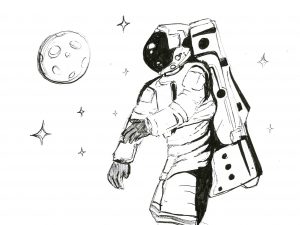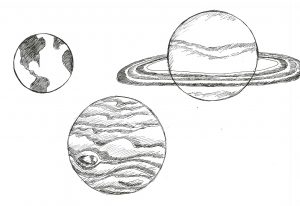
Author: Layal Bou Abdo MSN
Illustration: Angeline Boswell
Leaving this planet does very weird things to the human body. The human body in space is exposed to weightlessness, cosmic radiation, changes in sleep cycles and isolation. Astronauts in space face major challenges and problems.
Q and A, astronauts challenges in space

Why do astronauts wear spacesuits?
- Radiation exposure can damage the astronauts’ body cells and even their DNA. The reason why astronauts wear spacesuits and inside the space station have a special shield that protects them from harmful radiation.
Why do astronauts have to exercise daily in space?
- Because they are not resisting gravity anymore, astronauts may develop bones and muscle weakness/ loss. That’s why astronauts have to exercise at least 2 hours per day.
Why astronauts do not cry in space?
- Normally, our body compensates for the pull of gravity and works very hard to provide a normal circulation for the fluids in the body (the blood, the lymph and the cerebrospinal fluids causing abody fluids disturbance). In space, due to microgravity, fluid shifts away from the legs and up toward the head. As a result, the fluids end up collecting in the astronaut’s head creating headaches with flu-like symptoms and blurred vision caused by pressure around the eyes. For this same reason, astronauts do not cry in space the same way they do on earth. Their eyes make tears, but they stick as a liquid ball that hangs out in the eye and makes them feel worst.
Why astronauts do not take shower in space?
- All of the water that the astronaut gets has to be flown up by rockets. Since it’s so hard to get the water to space, it is only brought for drinking and eating. Astronauts do not take shower the way we do and instead, they take a sponge bath. Astronauts clean themselves with a towel, soap, and a little water and use a dry shampoo to clean their hair. To prevent the spread of germs, astronauts should keep themselves clean and their environment too.
Why do astronauts lose weight in space?
- Astronauts lose weight due to the loss of muscles and bones. Astronauts also may lose weight because of space motion sickness and what it causes from loss of appetite. Without gravity, food aromas waft away before making it to the nose. When you cannot smell very well you can’t taste very well. And because of the fluid shifting to the head, astronauts’ nose will be stuffy. Astronauts have to maintain a balanced and healthy diet that prevents them from losing weight.
Motion sickness is a conflict between the eye and ear: The inner ears detect movement, but the eyes — focused within a car or other vehicle — do not. These mixed signals coming into the brain can cause nausea, dizziness, vomiting, paleness, and cold sweats.
Other challenges that astronauts are facing in space
- The immune system will go crazy, it sometimes doesn’t respond to the threat as it should and sometimes it overreacts and responds aggressively to threats.
- Burping, for instance, becomes a real mess, because gravity is important in pushing the food in the stomach down as it raises the air to the esophagus. So, in space, the burp will come with some food.
How astronauts eat while in space
When you go camping, you would make sure that you have plenty of food. Astronauts do the same thing when they go to space. They prepare food depending on their type. Some food in space can be eaten in their natural forms like fruits and brownies, other food requires adding water like freeze-dried foods (spaghetti or macaroni and cheese) and dehydrated drinks. There is an oven on space to keep the food warm, however, there is no refrigerator. So, the preparation and the storage of the food’s space must be adequate to prevent spoilage.
Nutritionists follow up on astronauts’ diet and ensure that the food astronauts are eating is balanced with nutritious vitamins, minerals and calories. They eat 3 meals per day (plus periodic snacks).
To improve the food taste, condiments such as ketchup, mustard and mayonnaise are available.
Salt and pepper are available but only in a liquid form. This is because astronauts can’t sprinkle salt and pepper on their food in space. The salt and pepper would simply float away.
Astronauts’ foods comes in disposable packages that they throw away when they finish eating.
Six foods astronauts cannot eat in space
- Bread and chips; bread lacks the structure and shelf life to work as space food. Moreover, bread leaves crumbs that can float away and clog air vents.
- Alcohol because it might affect the Astronauts’ brain and their behaviour leaving them without mental clarity to make smart decisions.
- Salt and pepper and other granular spices and seasonings can make for a huge mess in microgravity. There is a danger they could clog air vents, contaminate equipment or get stuck in an astronaut’s eyes, mouth or nose.
- Carbonated beverages such as soda and coke act differently in space than on Earth. As a result, the Carbone Dioxide bubbles do not escape the drink and remain within the liquid. This can cause digestive discomfort.
- Astronaut Ice Cream because it is dehydrated and crumbly. It interferes with sensitive equipment and creates a dusty environment in microgravity.
- Fish are so smelly, and the smell traps for days in the spaceship. Moreover, fish cannot be stored for a long time (Freeze-dried shrimp would be one exception).

Fun facts, did you know that?
- Astronauts lose approximately 1 to 2% of their bone mass for each month they are in space.
- This means they lose 10% of their bone mass in less than a year.
- Astronauts strap themselves into sleeping bags to get their 8 hours of sleep a night!
- Medical, scientific, and engineering teams work together to maintain the physical, mental, and social well-being of humans in space and upon return to Earth? This is what we call space medicine.
- Astronauts wear two types of suits:
- An orange spacesuit or the Advanced Crew Escape suit. Astronauts wear it during the launching and landing period. The orange colour is the most visible colour against any landscape if there is any malfunction during those periods, forcing the astronauts to abandon the space shuttle. This will allow rescuers to spot the astronaut in the sea for example.
- A white spacesuit or the Extravehicular Activities suit. Astronauts wear it when they go outside the space shuttle to do some work. Its white colour protects the astronaut from heat and sunlight, preventing the astronaut from getting too warm. Moreover, the white colour makes it easy to spot the astronaut against the black expanse of space.
- The spacesuits have air pressure mimicking the atmospheric pressure. Spacesuits have airflows and communication connecting to the aircraft. They have multiple layers to protect the astronauts from heat. They even have a diaper.
- Doctor astronauts exist. Do you want to be one of them?
Is your child fascinated with the space, we recommend the educational website for them:
- Canadian Space agency: https://www.asc-csa.gc.ca/eng/activities/default.asp
- Nasa space place: https://spaceplace.nasa.gov
- Nasa Kids Club: https://www.nasa.gov/kidsclub/index.html
- Nasa at Home: https://www.nasa.gov/nasa-at-home-for-kids-and-families
We are certain your kid asks you health (human & animal) questions that genuinely leave you stumped! Leave a comment below and we are happy to answer “why” in future blogs.
Copyright © 2021 Little Medical School Ottawa

[…] Salt and pepper and other granular spices and seasonings can make for a huge mess in microgravity. There is a danger they could clog air vents, contaminate equipment or get stuck in an astronaut's eyes, mouth or nose. Carbonated beverages such as soda and coke act differently in space than on Earth. via […]
[…] https://littlemedicalschool.com/ottawa/blog/food-in-space/ […]
why do astronauts eat food in space
Thanks author for your post. Keep it up.
Your very informative article . ASTRONAUT’S
Thank you for your feedback!
[…] seasonings like salt and pepper aren’t out there of their conventional type. Nonetheless, small particular person packets of liquid salt and pepper might be utilized by astronauts in […]
[…] popular seasonings like salt and pepper aren’t available in their traditional form. However, small individual packets of liquid salt and pepper can be utilized by astronauts in […]
[…] popular seasonings like salt and pepper aren’t available in their traditional form. However, small individual packets of liquid salt and pepper can be utilized by astronauts in […]
[…] pPopular seasonings like salt and pepper are not available in their traditional form. however small individual packets of liquid salt and pepper It can be used by astronauts in […]
[…] popular seasonings like salt and pepper aren’t available in their traditional form. However, small individual packets of liquid salt and pepper can be utilized by astronauts in […]
[…] and pepper are usually not obtainable of their conventional type. Regardless of how small he’s Individual packets of liquid salt and pepper It may be utilized by astronauts in […]
[…] such as salt and pepper are not available in their traditional form. No matter how small he is Individual packets of liquid salt and pepper It can be used by astronauts in […]
[…] popular seasonings like salt and pepper aren’t available in their traditional form. However, small individual packets of liquid salt and pepper can be utilized by astronauts in […]
[…] and pepper are usually not out there of their conventional kind. Regardless of how small he’s Individual packets of liquid salt and pepper It may be utilized by astronauts in […]
[…] como la sal y la pimienta no están disponibles en su forma tradicional. Sin embargo pequeño paquetes individuales de sal y pimienta líquidas Puede ser utilizado por los astronautas en el […]